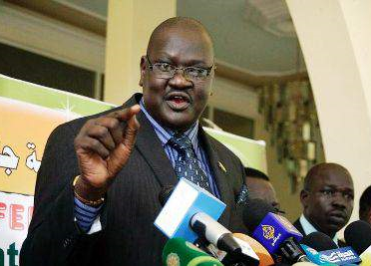South Sudan president accepts non-executive prime minister for rebels
October 27, 2014 (JUBA) – South Sudan’s president, Salva Kiir, has accepted to share power with the armed opposition forces allied to former vice president, Riek Machar, but on condition that the post of prime minister will not have executive powers.

“The president is ready to work with anybody the rebels will bring, including Riek Machar, if he will be their choice,” clarified Ateny.
According to him, President Kiir is a peace loving person and therefore wants peace to come back to the country because “he cares about the future of this country and its people.”
The presidential aide confirmed a number of concessions to the rebel forces, including their nominee to contest for any public office in the future elections and work with any nominee to the post of the prime minister.
Ateny further said that the head of state does not oppose adoption of federalism as the system of governance but he would like the peace to come first so that there is stability for all the people to participate in an inclusive process to decide the type of governing system they would like to be adopted.
“In principle, the president has never opposed federalism. What he has been saying is that let peace be given a priority so that everybody is given an opportunity at an all-inclusive process to participate,” said Ateny.
However, the spokesperson for the opposition leader, Riek Machar, said a prime minister’s position with no executive powers was a non-starter, hinting that the opposition faction of the Sudan Peoples’ Liberation Movement (SPLM-in-Opposition) would not accept this.
“We will not accept a position of non-executive prime minister. If there is going to be power-sharing between president and prime minister as a leadership structure, the prime minister should be the head of government,” said James Gatdet Dak, spokesman for the opposition leader.
Dak denied allegations that the rebel group was only interested in the top executive position to rule the country as a condition to end the war.
“It is not simply about getting the executive powers for the sake of it. It is about ensuring that the would-be agreement will be fully implemented. We have a program of introducing reforms under a federal system of governance. Salva Kiir and his associates will not do it at the helm of power,” he argued.
Dak however applauded the government for accepting federalism and accompanying reforms as demanded by the rebel group, but said Juba should not contradict itself by asking to delay their implementation.
He said the people of South Sudan would not any more entrust president Kiir or any of his colleagues in Juba to maintain executive powers which he “abused and used to silent democratic political processes and oversaw the massacre of 20,000 unarmed Nuer civilians in the capital.”
“We wouldn’t make another mistake to make Salva Kiir retain and abuse executive powers again after this crisis which he created on 15 December 2013. Not even one of his accomplices,” he said.
“What does he want leadership or executive powers for after failing the country for nearly ten years and finally tearing and plunging it into abyss?” he asked.
The opposition leader’s spokesman further said nobody trusted Kiir or his associates to implement federalism after he expressed his rejection to the call and “threatened parliamentarians, governors, and even citizens not to endorse or speak about federalism.”
He however said the rebel group was always ready and negotiating in good faith, but added it would be better if president Kiir forfeited the presidency to someone else.
The two parties are expected to resume the peace talks in Addis Ababa in the coming days in an attempt to end the 10-month old violence.
(ST)
